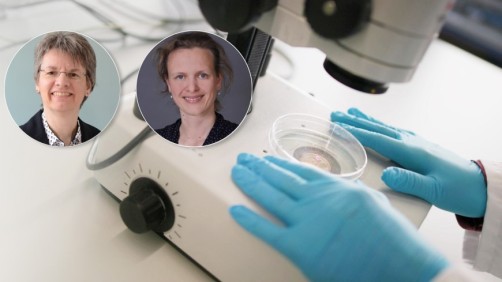‘Suddenly, you can communicate with each other’
Graduate Ellen Bräuer on her medical technology studies – part three of a five-part series
2025/10/08
Ellen Bräuer took up medical technology as a second degree rather by chance during her bachelor's studies and then switched to it completely for her master's degree. In this interview, the 33-year-old, who graduated in April 2024 and now works as a medical physicist, talks about her experiences – including the oddest ones.

If you had to explain the medical technology degree programme in one sentence, what would it be?
Ellen Bräuer: The name actually says it all: medical technology = medicine + technology. Engineers are taught the foreign language of ‘medicine,’ and suddenly everyone can communicate successfully with each other.
Why did you decide to study medical technology?
I had previously studied mechatronics (also at TU Darmstadt), but something was still missing, and I couldn't imagine working in that field. By chance, I heard about a new degree programme called Medical Technology and decided to start it as a second degree. I enjoyed it so much that I switched completely to medical technology for my Master's degree.
What was the biggest surprise for you when studying medical technology?
At first, I was surprised by the different attitude and teaching culture in the medical department. In some ways, it was a stark contrast to electrical engineering. Instead of doing maths exams with pen and paper, we had to do 100 per cent single-choice exams on laptops. Many lectures were also given more from the perspective of the pure user, whereas in Darmstadt I was used to looking at things from the perspective of the developer.
What was your coolest and what was your oddest experience during your studies?
It was bizarre having to call the lecturer in Frankfurt because we were all stuck on the train due to a line closure and couldn't make it to the lecture. Fortunately, the lecturer was kind enough to offer an alternative date.
Recommended external content
We have selected external content from YouTube for you and would like to show it to you right here. To do this, you must reveal it with one click. You can hide the external content at any time with another click.
I agree to external content from YouTube being shown to me. This may result in personal data being transmitted to third-party platforms. You can find more information in our Privacy Policy.
How important was the medical component of your studies in Frankfurt?
Without the medical component, the programme would have been incomplete. Medical professionals have their own technical language, and cooperation is only possible if everyone understands each other. I use my knowledge of anatomy, physiology and biology and my ability to ‘read’ CT image data every day in my job.
What advice would you give to first-year students or newcomers to university?
It's perfectly normal to fail an exam sometimes; it happens to almost everyone. Good self-organisation and the ability to persevere pay off. You should also find a balance to your studies in your free time: check out the bars in Darmstadt, go to concerts, the winter ball, university sports courses, sign up for university language courses and explore Darmstadt. There is so much to discover and try out.
What did you do besides your studies?
I worked as a student assistant and mentor at the university and took part in some of the university sports courses. I enjoyed Scottish country dancing so much that I joined the club after the course. I went hiking with friends in the Darmstadt area and definitely visited the climbing hall and the climbing forest at Lichtwiese quite often.
What are your career plans, and are they the same as when you started your studies?
When I started my studies, I had no idea what career I wanted to pursue. That's why I tried out many different elective courses during my bachelor's degree and chose my specialisation in my master's degree based on these experiences. After graduating, I started working as a medical physicist and am currently in the process of acquiring my MPE (medical physics expert) certification.
The questions were posed by the communications team of the Department of Electrical Engineering and Information Technology (etit) at TU Darmstadt.
Facts and Figures
The RMU cooperative degree programme Medizintechnik at a glance
- 132 – degrees awarded since the programme startet in the winter semester of 2018/19
- 256 – Number of bachelor's degree applications (winter semester 2024/25) for 120 slots
- 144 – Number of master's degree applications (winter semester 2024/25)
- 50,9 percent – Proportion of women in the bachelor's degree programme (winter semester 2024/25)
- 58,8 percent – Proportion of women in the Master's programme (winter semester 2024/25)
- 42 – Students spending time abroad (winter semester 2024/25);most popular destinations: Great Britain, Ireland, Scandinavia











